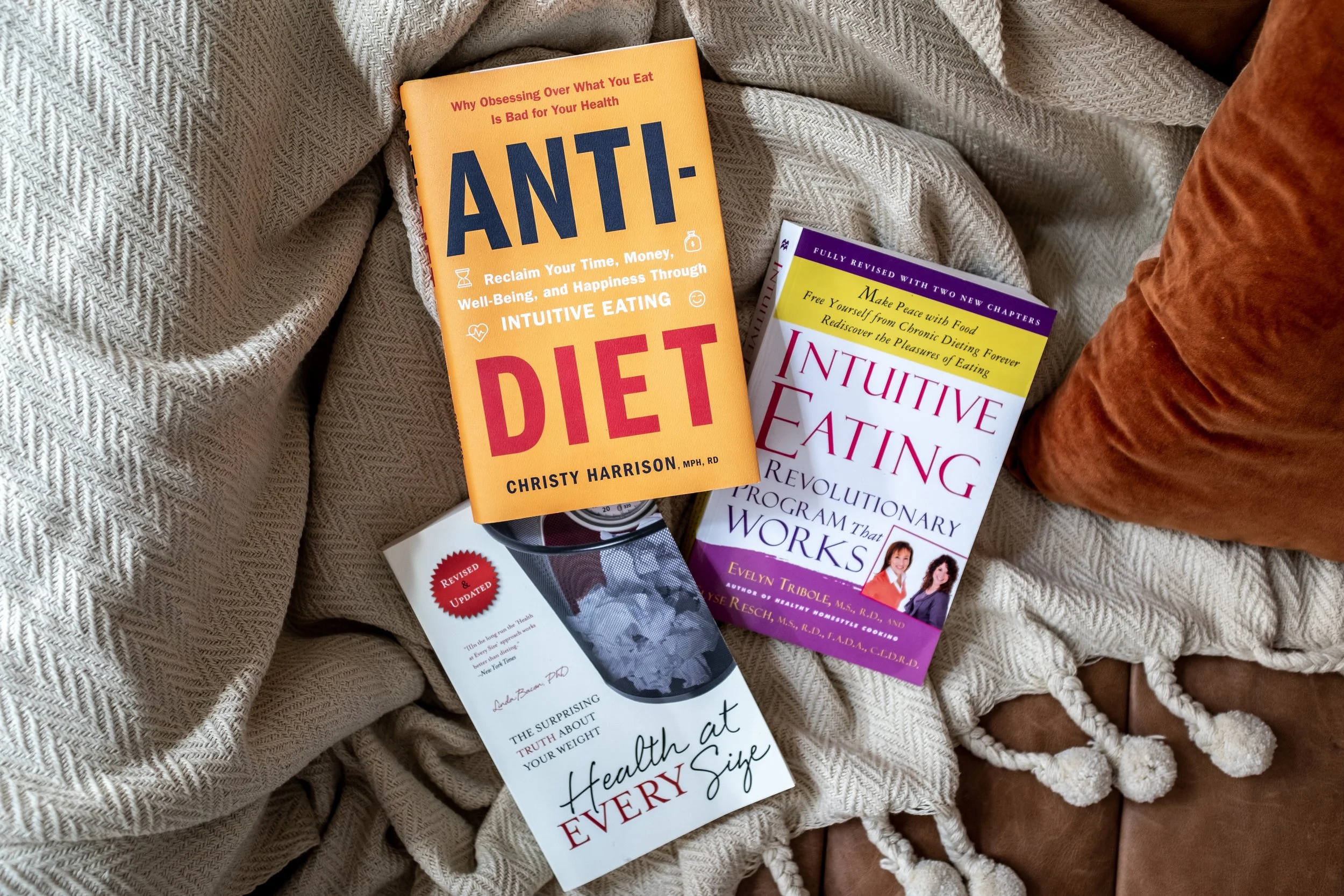Disordered Eating, Body Image
“We all want to be happy, accepted, and loved, which is what diet culture promises we’ll achieve through thinness and “perfect” eating.”
― Christy Harrison
“Intuitive eating is not a diet, but a way of life that honors your body's natural cues and allows you to eat in a way that is both nourishing and satisfying”
-Evelyn Tribole and Elyse Resch
Disordered Eating & Body Image: Beyond the Surface
We often think of disordered eating as purely psychological—a result of diet culture, trauma, or a desire for control. And while those factors are real, there is often a missing piece of the puzzle that traditional treatment ignores: Biology.
What if your "picky eating" or "food fear" wasn't just in your head? What if it was your body’s way of communicating inflammation?
In my practice, I take a holistic, investigative approach to disordered eating. I don't just look at your thoughts about food; I look at how food feels in your body.
The Missing Link: Chronic Illness & The Gut I specialize in the intersection of Disordered Eating and complex medical conditions like Mast Cell Activation Syndrome (MCAS) and POTS (Postural Orthostatic Tachycardia Syndrome).
Many of my clients have been told their digestive pain, nausea, or reactions to food are "psychosomatic" or "just anxiety." They are told to push through the pain to prove they aren't restricting. But for someone with MCAS, food reactions are real biological events.
Do you feel flu-like after eating leftovers?
Do you get brain fog or a racing heart after a meal?
Do you have "safe foods" not because of calories, but because everything else hurts?
If this sounds like you, standard Intuitive Eating advice ("Eat whatever you want!") can backfire. You cannot be intuitive with a body that is on fire. I help you distinguish between Eating Disorder Fear and Biological Sensitivity. We work to heal the gut and stabilize the immune system so that you can eventually eat with true freedom, not just white-knuckled endurance.
My Approach: The Integrated Model I integrate the principles of Health at Every Size (HAES) and Intuitive Eating with a trauma-informed, medically literate lens.
Safety First: We stabilize the body (and the nervous system) so that eating feels safe again.
Anti-Diet: We challenge the cultural lies that equate thinness with health.
The Whole Picture: We look at Trauma, Neurodivergence (Autism/ADHD often come with sensory food issues), and Biology together.
Navigating the GLP-1 Landscape (Ozempic/Wegovy) We are living in a new medical landscape. If you are taking, or considering, a GLP-1 medication, you may feel caught in the crossfire between Diet Culture and the judgment of the Anti-Diet community.
I offer a judgment-free, neutral space to navigate this. While I operate from a HAES perspective and do not promote weight loss as a primary therapeutic goal, I fiercely support Body Autonomy. I understand that for many—especially those with chronic "food noise" or metabolic issues—these medications can offer mental quiet.
Taking these medications does not mean you have "failed" Intuitive Eating. However, it does change the landscape. Because these medications alter your hunger cues, relying solely on instinct can sometimes lead to under-eating. We work together to ensure you are nourishing your body adequately, preventing old restrictive mindsets from hijacking the medication, and maintaining a peaceful relationship with food.
The Invitation Whether your struggle is rooted in body image, trauma, or a mystery illness that has made food an enemy, I am here to help you make peace with your plate.
Yet today there’s simply too much noise around the issues of food, hunger, and eating for us to listen to our own bodies. We live in a world that’s decided to define food as “good” or “bad,” a world that encourages us to ignore our hunger and fullness signals in favor of continually seeking out that Holy Grail of thinness, or to use food to fill needs that have nothing to do with sustenance.
-Evelyn Tribole and Elyse Resch

10 Principles of Intuitive Eating
Principle 1: Reject Diet Culture
Throw out the diet books, food plans, and articles that offer you false hope that that food restriction or dieting by any name you call it will grant all of your wishes for a better life. Rather than getting angry at yourself, get angry at the lies from diet culture have led you to feel as if you were a failure every time a new diet or food plan stopped working. If you allow even one small hope to linger that a new and better diet might be lurking around the corner, it will prevent you from being free to rediscover Intuitive Eating.
Principle 2: Honor Your Hunger
Keep your body biologically fed with adequate energy and carbohydrates. Otherwise, you can trigger a primal drive to eat beyond comfortable fullness. Once you reach the moment of excessive hunger, all intentions of moderate, conscious eating are fleeting and irrelevant. Learning to honor the first biological signal of hunger sets the stage for rebuilding trust with yourself and food.
Principle 3: Make Peace with Food
Call a truce—stop the food fight! Give yourself unconditional permission to eat. If you tell yourself that you can’t or shouldn’t have a particular food, it can lead to intense feelings of deprivation that build into uncontrollable cravings and, often, bingeing. When you finally give in to your forbidden food, eating will be experienced with such intensity that it usually results in Last Supper overeating and overwhelming guilt.
Principle 4: Discover the Satisfaction Factor
The Japanese have the wisdom to promote pleasure as one of their goals of healthy living. In our fury to be thin and healthy, we often overlook one of the most basic gifts of existence—the pleasure and satisfaction that can be found in the eating experience. When you eat what you really want, in an environment that is inviting and conducive, the pleasure you derive will be a powerful force in helping you feel satisfied and content. By providing this experience for yourself, you will find that you’ll eat the right amount of food to feel physically and emotionally satisfied.
Principle 5: Feel Your Fullness
Listen for the body signals that tell you that you are no longer hungry. Observe the signs that show that you’re comfortably full. Pause in the middle of eating and ask yourself how the food tastes and what your current fullness level is.
Principle 6: Challenge the Food Police
The food police monitor the unreasonable rules that dieting has created. The police station is housed deep in your psyche, and its loudspeaker shouts negative barbs, hopeless phrases, and guilt-provoking indictments. Chasing the food police away is a critical step in returning to Intuitive Eating.
Principle 7: Cope with Your Emotions with Kindness
First, recognize that food restriction, both physically and mentally, can, in and of itself, trigger loss of control, which can feel like emotional eating. Find kind ways to comfort, nurture, distract, and resolve your issues. Anxiety, loneliness, boredom, and anger are emotions we all experience throughout life. Each has its owntrigger, and each has its own appeasement. Food won’t fix any of these feelings. It may comfort for the short term, distract from the pain, or even numb you. But food won’t solve the problem. If anything, eating for anemotional hunger may only make you feel worse in the long run. You’ll ultimately have to deal with the source of the emotion, as well as the discomfort of eating beyond comfortable fullness.
Principle 8: Respect Your Body
Accept your genetic blueprint. Just as a person with a shoe size of eight would not expect to realistically squeeze into a size six, it is equally futile (and uncomfortable) to have a similar expectation about body size. But mostly, respect your body so you can feel better about who you are. It’s hard to reject the diet mentality ifyou are unrealistic and overly critical of your body size or shape. All bodies deserve dignity.
Principle 9: Movement—Feel the Difference
Forget militant exercise. Just get active and feel the difference. Shift your focus to how it feels to move your body, rather than the calorie-burning effect of exercise. If you focus on how you feel from working out, suchas energized, it can make the difference between rolling out of bed for a brisk morning walk or hitting the snooze alarm.
Principle 10: Honor Your Health—Gentle Nutrition
Make food choices that honor your well-being, taste buds, and culture; while attuning to how your body feels. Remember that you don’t have to eat perfectly to be healthy. You will not suddenly get a nutrient deficiency from one snack, one meal, or one day of eating. It’s what you eat consistently over time that matters. It might be surprising for you to learn that what you eat and how you move your body only accounts for ten percent of your health. Progress, not perfection, is what counts.



